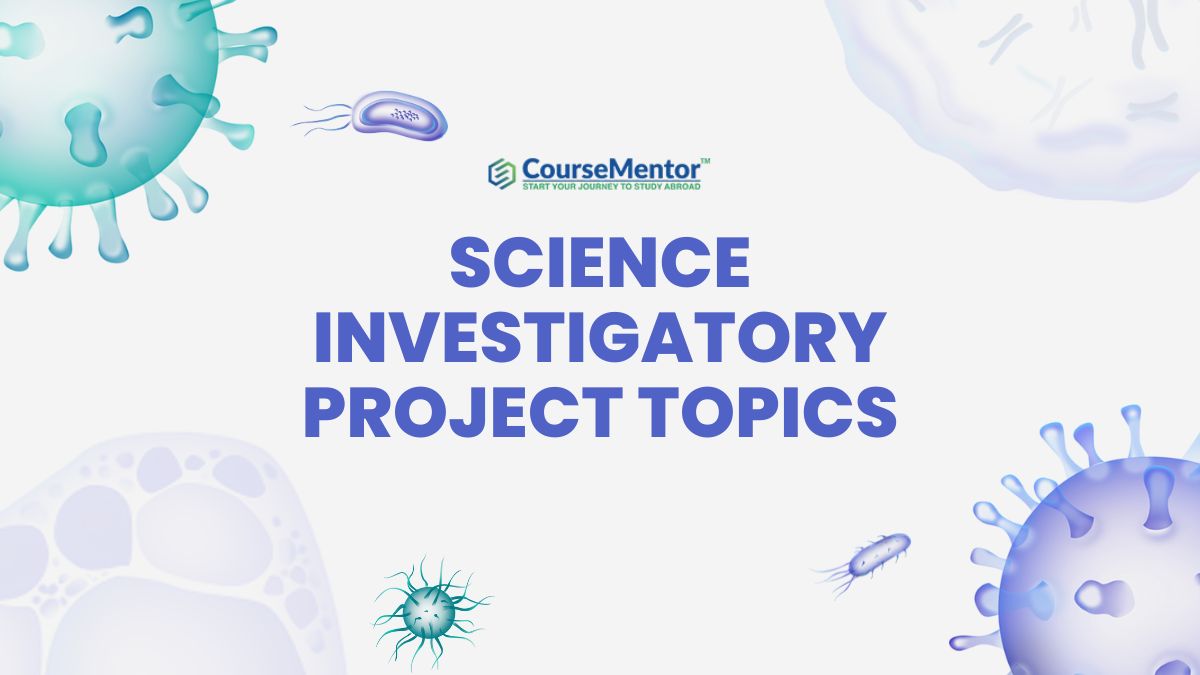Explore a wide range of science investigatory project topics to engage in innovative research and make significant contributions to the field.
Get ready to dive headfirst into the thrilling world of Science Investigatory Project (SIP) topics! Imagine a journey where you become a scientist, an explorer of the unknown, and a solver of real-world puzzles.
This is what SIP offers – a chance to channel your inner curiosity and creativity into the fascinating realm of science.
From unlocking the secrets of life in biology to experimenting with the wonders of chemistry, from unraveling the mysteries of the universe in physics to addressing vital environmental issues – SIP topics are your keys to a world of exploration.
In this adventure, we’ll guide you through an array of captivating SIP ideas. These topics aren’t just assignments; they’re opportunities to uncover new knowledge, make a difference, and have a blast along the way.
So, gear up for an exciting journey, as we unveil the science topics that could spark your imagination and fuel your passion for discovery. Let’s begin!
What is a Science Investigatory Project?
Imagine stepping into the shoes of a scientist – asking questions, running experiments, and discovering the secrets of the world around you. That’s exactly what a Science Investigatory Project, or SIP, is all about.
At its core, a SIP is a thrilling journey of scientific exploration. It’s a project that challenges you to pick a problem, make educated guesses (that’s your hypothesis), roll up your sleeves for experiments, collect data, and connect the dots to find answers.
Here’s how it works
Step 1: The Mystery
You start with a question – something that piques your curiosity. It could be anything from “Why do plants grow towards the light?” to “What makes the sky blue?” Your SIP is your ticket to unravel these mysteries.
Step 2: The Guess
Next comes your hypothesis – a fancy word for your best guess at the answer. It’s like saying, “I think this is what’s happening, and here’s why.”
Step 3: The Detective Work
Now, it’s time for the fun part – experimenting! You set up tests, tweak variables, and observe closely. Whether you’re mixing chemicals, observing insects, or measuring temperature, you’re the scientist in charge.
Step 4: Clues and Evidence
As you experiment, you collect clues in the form of data – numbers, measurements, observations. It’s like gathering puzzle pieces.
Step 5: The “Aha!” Moment
When you analyze your data, patterns start to emerge. You connect those puzzle pieces until you have a clear picture. Does your data support your guess (hypothesis), or do you need to rethink things?
Step 6: Sharing Your Discovery
Scientists don’t keep their findings to themselves. They share them with the world. Your SIP report or presentation is your chance to do just that. You explain what you did, what you found, and why it matters.
So, why do SIPs matter? They’re not just school projects. They’re your chance to think like a scientist, ask questions like a detective, and discover like an explorer. They’re where you become the expert, the innovator, the problem-solver.
From the mysteries of biology to the wonders of chemistry and the enigmas of physics, SIPs open doors to countless adventures in science. So, what question will you ask? What mystery will you solve? Your SIP journey awaits – embrace it, and you might just uncover something amazing.
Choosing the Right SIP Topic
Choosing the right Science Investigatory Project (SIP) topic is like selecting a path for your scientific adventure. It’s a critical decision, and here’s how to make it count:
Follow Your Passion
Your SIP topic should resonate with your interests. Pick something you’re genuinely curious about. When you’re passionate, the research becomes a thrilling quest, not a chore.
Real-World Relevance
Consider how your topic connects to the real world. Can your research shed light on a problem or offer solutions? SIPs are a chance to make a tangible impact.
Feasibility
Be realistic about the resources at your disposal. Choose a topic that you can explore within your time frame and access to equipment. Avoid overly ambitious projects that might overwhelm you.
Originality Matters
While it’s okay to explore well-trodden paths, strive for a unique angle. What can you add to the existing knowledge? Innovative ideas often lead to exciting discoveries.
Mentor Guidance
If you’re feeling uncertain, don’t hesitate to seek guidance from teachers or mentors. They can help you refine your ideas and offer valuable insights.
Remember, your SIP topic is the compass for your scientific journey. It should excite your curiosity, have real-world significance, and be feasible within your means. So, choose wisely, and let your scientific adventure begin!
Popular Science Investigatory Project Topics
Now that we’ve established the criteria for selecting a SIP topic, let’s explore some captivating ideas across various scientific domains.
Biology
- Investigating the Effects of Various Soil Types on Plant Growth
- The Impact of Different Water pH Levels on Aquatic Life
- Studying the Behavior of Insects in Response to Environmental Changes
- Analyzing the Effect of Different Light Intensities on Photosynthesis
- Exploring the Microbial Diversity in Different Soil Samples
- Investigating the Antioxidant Properties of Various Fruit Extracts
- Studying the Growth Patterns of Mold on Different Types of Food
- Analyzing the Effects of Temperature on Enzyme Activity
- Investigating the Impact of Pollution on the Health of Local Wildlife
- Exploring the Relationship Between Diet and Gut Microbiota Composition
Chemistry
- Developing Eco-Friendly Cleaning Products from Household Ingredients
- Investigating the Chemical Composition of Common Food Preservatives
- Analyzing the Effects of Different Chemical Reactions on Metal Corrosion
- Studying the Factors Affecting the Rate of Vitamin C Degradation in Fruit Juices
- Exploring the Chemistry Behind the Colors of Fireworks
- Investigating the Efficiency of Various Household Water Softeners
- Synthesizing Biodegradable Polymers from Natural Sources
- Studying the Chemical Reactions Involved in Baking Soda and Vinegar Reactions
- Analyzing the Impact of Acids and Bases on Tooth Enamel
- Investigating the Chemical Composition of Different Brands of Shampoos
Physics
- Designing and Testing a Solar-Powered Water Heater
- Investigating the Factors Affecting the Bounce Height of Balls
- Studying the Relationship Between Temperature and Electrical Conductivity in Materials
- Analyzing the Efficiency of Different Insulating Materials
- Exploring the Effects of Magnetism on Plant Growth
- Investigating the Behavior of Sound Waves in Different Environments
- Studying the Impact of Projectile Launch Angles on Distance
- Analyzing the Factors Affecting the Speed of Falling Objects
- Investigating the Reflection and Refraction of Light in Different Media
- Exploring the Relationship Between the Length of a Pendulum and Its Period
Environmental Science
- Analyzing the Effects of Urban Green Spaces on Air Quality
- Investigating the Impact of Microplastics on Marine Life
- Studying the Relationship Between Temperature and Ocean Acidification
- Exploring the Effects of Deforestation on Local Ecosystems
- Investigating the Factors Contributing to Soil Erosion in a Watershed
- Analyzing the Impact of Noise Pollution on Wildlife Behavior
- Studying the Relationship Between Temperature and Ice Melt Rates
- Investigating the Effect of Urbanization on Local Bird Populations
- Exploring the Impact of Air Pollution on Human Health in Urban Areas
- Analyzing the Biodiversity of Insects in Urban vs. Rural Environments
Social Sciences
- Analyzing the Impact of Social Media Use on Teenagers’ Mental Health
- Investigating the Factors Influencing Online Shopping Behavior
- Studying the Effects of Different Teaching Methods on Student Engagement
- Analyzing the Impact of Parenting Styles on Children’s Academic Performance
- Investigating the Relationship Between Music Preferences and Stress Levels
- Exploring the Factors Contributing to Workplace Stress and Burnout
- Studying the Effects of Socioeconomic Status on Access to Healthcare
- Analyzing the Factors Influencing Voting Behavior in Local Elections
- Investigating the Impact of Advertising on Consumer Purchasing Decisions
- Exploring the Effects of Cultural Diversity on Team Performance in the Workplace
These SIP topics offer a wide range of research opportunities for students in biology, chemistry, physics, and environmental science. Students can choose topics that align with their interests and contribute to their understanding of the natural world.
Conducting Your SIP
So, you’ve picked an exciting Science Investigatory Project (SIP) topic and you’re all set to dive into the world of scientific exploration. But how do you go from a brilliant idea to conducting your own experiments? Let’s break it down into easy steps:
Step 1: Dive into Research
Before you start mixing chemicals or setting up experiments, it’s time for some detective work. Dive into research! What’s already out there about your topic? Books, articles, websites – explore them all. This background study gives you the superpower of knowledge before you even start.
Step 2: Hypothesize Away!
With all that newfound wisdom, formulate a hypothesis. Don your scientist’s hat and make an educated guess about what you think will happen during your experiments. It’s like making a bet with science itself!
Step 3: Time for Action
Now comes the fun part. Design your experiments. What materials do you need? What steps should you follow? Imagine you’re a mad scientist with a plan! Then, go ahead and conduct your experiments. Be precise, follow your plan, and observe like Sherlock.
Step 4: Collect That Data
During your experiments, be a data ninja. Record everything. Measurements, observations, weird surprises – they’re all clues! The more detailed your notes, the better.
Step 5: Decode Your Findings
Time to put on your detective’s hat again. What do your data and observations tell you? Look for patterns, anomalies, and secrets your experiments are revealing. This is where the real magic happens.
Step 6: The Big Reveal
Now, reveal the grand finale – your conclusions! Did your experiments support your hypothesis, or did they throw you a curveball? Discuss what your findings mean and why they matter. It’s like solving the mystery in a thrilling novel.
Step 7: Your SIP Report
Finally, put it all together in your SIP report. Think of it as your scientific storybook. Share your journey with the world. Start with the introduction, add in your methodology, sprinkle your results and discussions, and wrap it up with a conclusion that leaves your readers in awe.
Remember, this isn’t just about science; it’s about your adventure in discovering the unknown. Have fun, be curious, and let your inner scientist shine!
What is a good topic for an investigatory project?
A good topic for an investigatory project depends on your interests and the resources available to you. Here are some broad categories and potential topics to consider:
Environmental Science
- The Impact of Different Fertilizers on Plant Growth
- Investigating the Effect of Air Pollution on Local Plant Life
- Analyzing the Quality of Drinking Water from Various Sources
- Studying the Growth of Microorganisms in Different Water Types
Chemistry
- Creating Biodegradable Plastics from Natural Materials
- Investigating the Chemical Composition of Household Cleaning Products
- Analyzing the Effects of Different Cooking Oils on Food Nutrition
- Testing the pH Levels of Various Household Substances
Biology
- Studying the Behavior of Ants in Response to Different Food Types
- Investigating the Impact of Light Exposure on Seed Germination
- Analyzing the Effects of Different Music Types on Plant Growth
- Exploring the Microbial Diversity in Different Soil Samples
Physics
- Designing and Testing a Simple Wind Turbine
- Investigating the Relationship Between Temperature and Electrical Conductivity in Materials
- Studying the Behavior of Different Types of Pendulums
- Analyzing the Factors Affecting the Efficiency of Solar Panels
Social Sciences
- Analyzing the Impact of Social Media Use on Teenagers’ Sleep Patterns
- Investigating the Factors Influencing Consumer Behavior in Online Shopping
- Studying the Effects of Different Teaching Methods on Student Learning
- Analyzing the Relationship Between Music Preferences and Mood
Computer Science and Technology
- Developing a Smartphone App for Personal Productivity
- Investigating the Factors Affecting Wi-Fi Signal Strength in Different Locations
- Analyzing the Impact of Screen Time on Productivity and Well-being
- Studying the Efficiency of Different Coding Languages in Software Development
When choosing a topic, consider your interests, available resources, and the potential impact of your project. It’s essential to select a topic that excites you and allows you to conduct meaningful research.
Additionally, check with your school or instructor for any specific guidelines or requirements for your investigatory project.
What should I do in a science investigatory project?
So, you’re all set to embark on a thrilling adventure known as a Science Investigatory Project (SIP). But where do you start, and what should you be doing? Here’s your guide to diving headfirst into the world of scientific exploration:
Choose a Topic That Sparks Your Interest
Begin by picking a topic that genuinely excites you. It should be something you’re curious about, like “Why do plants grow towards the light?” or “How does pollution affect local water quality?”
Unleash Your Inner Detective with Background Research
Dive into the world of books, articles, and online resources. Learn everything you can about your chosen topic. It’s like gathering clues to solve a mystery.
Craft Your Hypothesis – Your Educated Guess
Formulate a hypothesis. Think of it as your scientific prediction. What do you think will happen when you investigate your question? Make an educated guess and write it down.
Plan Your Scientific Experiments
Now, let’s get hands-on! Plan your experiments. What materials will you need? What steps will you follow? Imagine you’re a mad scientist with a plan to uncover the secrets of the universe!
Collect Data – Be a Data Ninja
During your experiments, be a data ninja! Record everything meticulously. Measurements, observations, quirky surprises – they’re all part of your data treasure trove.
Decode Your Findings – Be a Scientific Sleuth
Time to decode the clues! Analyze your data like a scientific sleuth. Look for patterns, unexpected twists, and, most importantly, what your experiments are trying to tell you.
Share Your Scientific Tale: The SIP Report
It’s time to tell your scientific tale. Create your SIP report – your storybook of science. Start with the introduction, add in your experiments, sprinkle with results, and wrap it up with a conclusion that leaves your readers in awe.
Share Your Discoveries with the World
If you can, share your SIP findings. Present your work to your classmates, at science fairs, or anywhere you can. Share your excitement about science with the world!
Remember, SIP isn’t just about following steps; it’s about your adventure in discovering the mysteries of the universe. So, stay curious, have fun, and let your inner scientist shine!
What are the best topics for investigatory project chemistry class 12?
Hey there, future chemists! It’s time to explore the fascinating world of Chemistry with some class 12 investigatory project ideas that will not only challenge your scientific skills but also pique your curiosity:
Water Wizardry
Dive into the world of H2O and analyze water samples from different sources – tap water, well water, and that bottled stuff. Let’s uncover the secrets of your hydration!
Biodiesel Bonanza
Ever wondered if you could turn cooking oil into fuel? Investigate the synthesis of biodiesel from everyday vegetable oils, and let’s see if we can power the future with French fries!
Vitamin C Showdown
Put on your lab coat and determine the vitamin C content in various fruit juices. Is your morning OJ really packed with vitamin C? Let’s find out!
Race Against Time – The Iodine Clock
Get ready to race time itself! Study the kinetics of the iodine clock reaction and see how factors like concentration and temperature affect this chemistry marvel.
Shampoo Chemistry
Let’s turn your shower into a science lab! Test the pH levels of different shampoos – are they gentle or are they acidic? Your hair deserves the best!
Heavy Metal Detectives
Investigate soils for heavy metals. Are there hidden dangers lurking beneath our feet? Let’s discover the truth and protect the environment.
Metal Makeover
Ever dreamed of turning ordinary objects into shimmering treasures? Electroplate items like coins or jewelry with various metals and unveil their magical transformations!
The Dye Chronicles
Explore the vibrant world of food dyes used in your favorite treats. What’s really behind those bright colors? Let’s uncover the secrets of our rainbow foods!
Solubility Sleuths
Unravel the mysteries of solubility! How does temperature impact the solubility of common salts? Let’s dissolve some science questions.
Perfume Alchemy
Dive into the world of fragrances! Analyze the chemical components in different perfumes and discover the magic behind your favorite scents.
Remember, the best project is one that not only challenges you but also stirs your scientific curiosity. Choose a topic that excites you, and let your chemistry adventure begin!
What are good science experiment ideas?
Biology
- Light Dance with Plants: Imagine plants swaying to the rhythm of light! Explore how different types of light affect plant growth – from disco-like colorful LEDs to the soothing glow of natural sunlight.
- Kitchen Warriors: Don your lab coat and investigate everyday kitchen items like garlic, honey, and vinegar as germ-fighting superheroes. Who knew your kitchen could be a battleground for bacteria?
- Animal Extravaganza: Dive into the world of critters! Observe and report on the curious behaviors of your chosen animal buddies. It’s like being a wildlife detective in your own backyard.
Chemistry
- Fizz, Pop, and Bang: Get ready for some explosive fun! Experiment with classic chemical reactions that sizzle and explode, like the volcanic eruption of baking soda and vinegar.
- Titration Showdown: Become a master of precision with acid-base titration. Unlock the secrets of unknown solutions, like a chemistry detective solving mysteries.
- Crystal Kingdom: Step into the magical world of crystals. Grow your own dazzling crystals and reveal how factors like temperature and concentration influence their growth.
Physics
- Swingin’ Pendulums: Swing into action with pendulums! Investigate how factors like pendulum length and mass affect the way they sway. It’s like dancing with physics.
- Machine Marvels: Enter the world of simple machines. Uncover the mechanical magic behind levers, pulleys, and inclined planes as you lift heavy objects with ease.
- Electromagnet Madness: Get electrified! Build your own electromagnet and experiment with coils and currents to see how they shape magnetic fields.
Environmental Science
- Water Adventure: Dive into water quality testing. Collect samples from different sources and become a water detective, searching for clues about pollution and health.
- Air Expedition: Take to the skies with your own air quality station. Discover what’s floating in the air around you, from tiny particles to invisible gases.
- Climate Crusaders: Join the battle against climate change. Investigate how shifts in temperature and precipitation patterns impact your local ecosystem.
Earth Science
- Rock Detectives: Grab your magnifying glass and investigate rocks and fossils in your area. It’s like traveling through time to uncover Earth’s ancient secrets.
- Weather Watchers: Become a meteorologist with your own weather station. Predict the weather and marvel at how the atmosphere behaves around you.
- Volcano Eruption Spectacle: Get ready for volcanic eruptions without the lava! Create a stunning volcano model and watch it come to life with your own eruptions.
Astronomy
- Starry Nights: Explore the cosmos with a telescope and discover celestial wonders, from the rings of Saturn to the galaxies far, far away.
- Moon Phases Odyssey: Join the lunar calendar club! Track the Moon’s different faces over weeks and become an expert on lunar phases.
- Solar Eclipse Spectacle: Witness the sky’s ultimate blockbuster – a solar eclipse! Safely observe this cosmic dance with eclipse glasses and telescopes.
These science experiments are not just about learning; they’re about unleashing your inner scientist and having a blast along the way! So, pick your favorite, put on your lab coat, and let the science adventures begin!
Conclusion
In wrapping up our exploration of Science Investigatory Project (SIP) topics, it’s clear that we’ve uncovered a treasure trove of possibilities. These topics are more than just words on a page; they’re gateways to adventure, inquiry, and understanding.
We’ve ventured into diverse realms of science, from the secrets of plant life to the hidden chemistry of everyday items. We’ve danced with the laws of physics, delved into environmental enigmas, and probed the complexities of human behavior. These topics aren’t just ideas; they’re invitations to explore the wonders of our world.
So, as you consider your own SIP journey, let your curiosity be your compass. Pick a topic that truly intrigues you, one that keeps you awake at night with questions. Embrace the process – the experiments, the surprises, and the “Aha!” moments.
Remember, it’s not just about reaching a conclusion; it’s about the exhilarating path you take to get there. SIPs are your chance to be a scientist, an explorer, and a storyteller all at once. So, go ahead, choose your topic, embark on your adventure, and share your discoveries with the world. Science is waiting for your curiosity to light the way!





